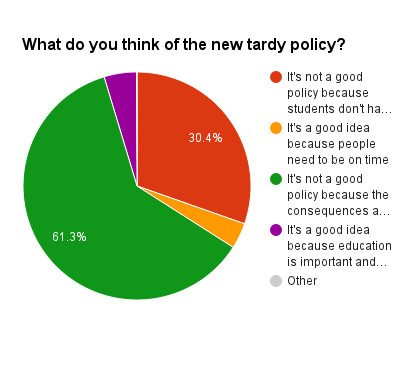New Tardy Policy Seems Too Harsh, Has Merit
 By staff writer Sagar Samuel
By staff writer Sagar Samuel
For the past few years, Parkway North High School has had a problem with students not arriving on time to class during instruction periods. The new tardy policy is striking down on students who are constantly tardy to class by issuing multiple detentions that lead
to a three hour stay after school and a chat with their parents.
Some students believe that these consequences are too extreme or that the administrators
are asking too much. However, even though some students may not agree with this new policy, it is already showing more
consistent results of students across all grade
levels attending class on time which is a positive
improvement from earlier years.
“For the past two or three years, part of
our state reporting has to do with attendance
in classes, so that changed the way we make
note of tardies and absences,” said principal
Dr. Jenny Marquart. “At the end of last
year, we talked with the staff and made a new kind of reporting system that administrators
would assign detentions instead of teachers, and that’s what we are trying.”
Throughout the past years, attendance and tardy policies were very inconsistent between
schools and even individual classes at North. While some teachers had a strict tardy
policy that resulted in detentions, others had no consequences for tardies.
The goal of the new policy is to create
more consistency related to what is expected
from students in different classes as well as
to obtain a better, more accurate summary
of the tardies and attendance for the district
and the state, and to satisfactory improve attendance.
With the addition of the new tardy policy,
there are some regulations that are unfamiliar
with a lot of students. “Our practice is,
if a student has three total tardies, not just in
an individual class, they’ll get a warning from
their administrator. At five tardies, they get a
detention. At seven tardies, they get another
detention. At nine tardies, they get a three
hour detention, plus parents are contacted
for a meeting to do some problem solving to
see what we can do as a whole to make sure
students are where they need to be when they
need to be there,” said senior principal Greg
Wagener.
With the introduction of this new policy,
attendance has already seen a positive
improvement across all grade levels. More
students are arriving to class on time and
instructional time is being used more wisely.
This also has resulted in safer hallways since
fewer students are in the halls unattended.
Although the administrators and staff
are satisfied with this practice, some students
are against this policy. Sixty-one percent of
responses received indicated that students
believe the new policy “is not a good policy
because the consequences are too harsh.
“Three or five tardies in one semester
is asking way too much. Ten is a reasonable
amount because there are ways students can
be late without just slacking off,” said senior
James McWard.
Sometimes, students may have missed
the bus, were in the crowded restrooms, or
left something in their locker which is on the
other side of building. All of these scenarios
are viable possibilities and good reasons as to
why one may be tardy.
However, even though there are some
students who do have legitimate excuses for
being late, others do not.
“People sleep through their alarm once
in awhile. It happens. Sometimes you may
have a problem with your car, you have no
ride, or there is too much traffic to arrive on
time,” said McWard. Even though this is a
very true statement and this does happen, it
does not happen as often to accumulate the
five tardies needed to receive a detention.
This new policy is not aimed at punishing
students who make a mistake and need
a break occasionally. It is meant to help students
get to class on time and use their passing
periods wisely. It is extremely important
for students to be in class on time to both get
the most out of their learning and to help
classes run smoothly without interruptions
from tardy students.
Furthermore, this new policy helps prepare
students for life after high school.
“If you think about it, out in the real
world when all of my seniors will have a job
at some point, if they were habitually tardy
to their place of employment and their supervisor
said, ‘This is the fifth time in two
weeks that you’ve been late to work’ and the
employee said, ‘Oh yeah I had to talk to my
friends’ or are doing whatever for that matter,
it’s not going to take five times before
the employer says, ‘Oh, okay. Well you don’t
work here anymore.’ and just fires them,”
said Wagener.
Regarding the Viking Pass that is available
to seniors: accumulating an unexcused
absence or seven tardies results in a retraction
of the pass without a refund. It may
seem a bit unfair, but it encourages students
to arrive to school and class on time and set
priorities.